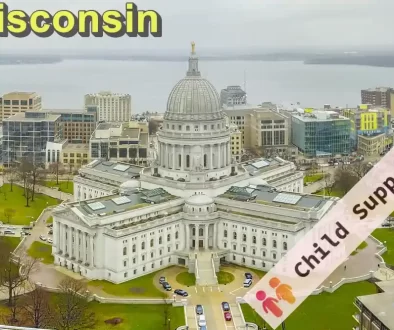Child Support in New Mexico
The parents of a child have a moral responsibility to support their child in any way they can, including financially, emotionally, etc. However, when parents separate or divorce, the noncustodial parent usually leaves all the responsibility for the custodial parent to bear. In a bid to help provide a decent living for the child, child support laws have been established. These laws create a legal obligation to care for the child, which the noncustodial parent must fulfill.
Child Support Process After Divorce
Child Support Services in New Mexico are provided by the Child Support Enforcement Division (CSED), which is under the Human Services Department (HSD). Parents with an existing child support order can apply for Wage Withholding services (also known as Pass-Through Services). This is only available to parents who have a preexisting child support order that allows income withholding. The application for Wage Withholding can be obtained at https://www.hsd.state.nm.us/wp-content/uploads/FileLinks/66d9be53b42140e7896fb585ba60b006/Wage_Withholding_Only.pdf.
Parents without any child support order can apply for full services. Applying for full services of the CSED means that they will help locate the noncustodial parent, locate the employer of the noncustodial parent, establish paternity, if necessary, establish the child support order, as well as collect and enforce the child support payments. The application form can be found at https://www.hsd.state.nm.us/wp-content/uploads/FileLinks/66d9be53b42140e7896fb585ba60b006/Full_Services.pdf. In this form, custodial parents are expected to provide details of themselves, the child, and the noncustodial parent. Some of the information fields in the section about the noncustodial parent include full name, sex, date of birth, home and work phone number, residential address, employer details, Social Security Number (SSN), etc. Providing these details can make locating the parent easier, thus potentially speeding up the process of establishing child support. This is because the noncustodial parent must first be located and physically served a notice of child support before the case can progress.
When the noncustodial parent has been located, the next step is to establish paternity. For parents who were married at the time of the child’s birth, the mother’s husband is presumed to be the father. However, if the parents were not married, they can complete an Acknowledgement of Paternity. Once this is done, the man’s name can be added to the child’s birth certificate. For more information on Acknowledgment of Paternity, visit https://www.hsd.state.nm.us/wp-content/uploads/FileLinks/66d9be53b42140e7896fb585ba60b006/AOP_Brochure.pdf. In situations where the paternity of the child is disputed, the court may order genetic testing to establish the paternity of the child. After paternity is established, the child support order can be established. A $250 fee is charged for establishing the child support order. This is deducted from the child support payments made to the parent but does not apply to families receiving public financial assistance.
Parents can also apply for a modification of an existing child support order. This is usually due to a significant change in income of any of the parents, or changes in the need of the child. However, before applying for a review, parents should note that the modification should result in at least a 20% change in the existing child support obligation. Parents are charged $150 for each review and modification of their child support order. For details on reviewing a child support order, visit https://www.hsd.state.nm.us/lookingforassistance/requesting-a-modification/
How Do You Receive Child Support?
The CSED offers multiple options for custodial parents to receive child support. These are:
- Check: This is an old method of receiving child support. A check is issued for the child support payment and mailed to the custodial parent. Receiving payments via check is not a secure means and is not recommended by the CSED.
- Debit Card: Parents can opt to receive their child support payments on a prepaid debit card. The parents are issued a debit card and will have the funds loaded to it as they become available. The card can be used like a regular debit card and may be subject to fees related to certain transactions. This is a secure means of receiving child support payments.
- Direct Deposit: The final option is the direct deposit. This allows the child support payments to be made into an existing savings or checking account which has been authorized by the custodial parent. Direct deposit is the fastest, safest, and easiest way to receive child support payments. Parents who wish to go with this option can fill the Direct Deposit Authorization Form at https://www.hsd.state.nm.us/wp-content/uploads/FileLinks/66d9be53b42140e7896fb585ba60b006/Direct_Deposit_Authorization_Form_2.pdf.
For more information on how to receive child support payments, visit https://www.hsd.state.nm.us/lookingforassistance/receiving-payments/.
Maximum Amount Receivable as Child Support
In deciding the child support obligations of the noncustodial parent, there is no absolute maximum that can be paid out. The court considers several factors like the gross income of both parents, the number of children, the specific needs of the child, and any other special factors peculiar to the case. The aim is to set a fair amount that is not too much for the noncustodial parent to pay, yet not too little to assist the custodial parent in covering childcare costs. For full details on the considerations and associated resources, visit https://www.hsd.state.nm.us/lookingforinformation/child-support-enforcement-division-1/. A copy of the basic child support guidelines can be found at https://www.hsd.state.nm.us/wp-content/uploads/2020/12/basic_child_support_schedule.pdf. The state also hosts a child support calculator for reference purposes. This can be accessed at https://appjidcsworksheet-nmcourts.sks.com/csworksheet/.
Enforcement of Child Support
The Child Support Enforcement Division monitors the child support payments of administered cases. After the establishment of child support, a $250 fee is deducted from the payments for enforcement services. When payments are not made on time or are incomplete, CSED takes actions to enforce the payments. These include sending a warning letter to notify defaulting parents of their outstanding child support, suspending driver’s license and other professional or recreational licenses, placing a lien on property or bank accounts, denying passport applications, intercepting tax refunds, etc. In extreme cases, a bench warrant may have to be issued. For more information, visit https://www.hsd.state.nm.us/lookingforassistance/enforcement-remedies/.




